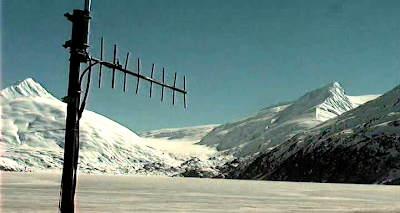Director: Dariusz Kowalski
Year: 2006
Time: 8 mins
Music: Stefan Németh
Eye of Sound: Although perhaps cruder in gesture and less lyrical in effect, Kowalski's Elements shares many technical and thematic affinites with Elke Groen's Nightstill. The protagonists are the same: the snowy uninhabitable landscapes, not of the Alps, but of the Alaska; the unflinching winds that daily sweep its vast plains and push cloud formations to their inevitable dissolution; the monotonous light cycles that cast an illusion of change on an unchanging eyescape; and the sometimes disturbingly illusory permanence of man-made and natural scenic objects immersed in a tumultuous and violent wash of transformation. The technical means used to articulate this beautiful study on landscape also bear similarities to Nightstill, resorting to an impressive application of time-lapse in order to inflict violent temporal dislocations on an otherwise placid picture. Unlike Groen's work, however, Elements does not venture into the field and uses footage taken from a website designed to observe the weather in Alaskan airfields: this lends it a much rougher quality but also a starker, unembellished perspective on the ice deserts. This starker approach is also reflected in Németh's soundtrack: grainy particles of sound that seem intended to emulate the violent clash of wind and dust against the camera only briefly give in to more "musical" drones that are immediately followed by figurative allusions to aeroplanes, wind hisses and control-tower voice-cracks.






